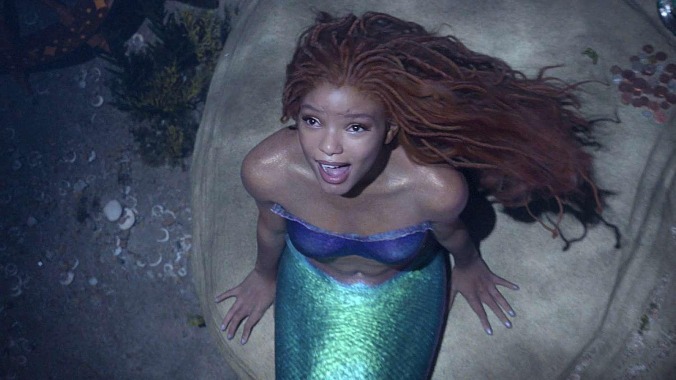The Little Mermaid review: Halle Bailey excels in a watered-down remake
A campy Melissa McCarthy also shines in a film that's better than most Disney live-action reboots—but that's not the same thing as being good

Another day, another Disney remake. The Mouse House’s decade-long trend of realizing their animated canon in live action—or whatever The Lion King was—has been commented upon ad nauseum, criticized for their revisionism of stories that didn’t need revising and their bland aesthetic that realizes the cartoony pleasures of the previous films in an uncannily realistic mode. Their crack at The Little Mermaid is better than many of the company’s previous attempts, as many of the changes strike a decent balance between homage to the 1989 animated original and what can—and should be—realistic sea creatures. But when it comes to picking out what parts of Ariel’s story to tweak for the new medium, the remake still emphasizes the wrong pieces, consequentially bloating a previously brisk story into a meandering pile of producers’ script notes.
Much of the animated film’s first act is preserved more-or-less intact (beat-for-beat translations of the original’s script in some cases) with bits of set-up added for changes that will be explored later. As Ariel (Halle Bailey) fantasizes about the wonders of the human world, gathering thingamabobs for her neat little collection and thirsting after the first human boy she sees (Jonah Hauer-King), King Triton (Javier Bardem) tries to steer her away from dangerous land-dwellers. But when the sea witch Ursula (Melissa McCarthy) tempts Ariel with the chance to walk on land in exchange for her voice, the young merlady can’t resist the chance to pursue true love’s kiss.
Halle Bailey is an immediate standout as Ariel, evoking the wide-eyed innocence of a naïve, lovestruck teenager while belting out musical numbers with the gusto of a Broadway star in the making. Similarly, Hauer-King’s Prince Eric is given more dimension than in the 1989 version as a wanderlusting dreamer, so he serves as a solid romantic counterpart to Bailey. However, the rest of the cast is a mixed bag. Daveed Diggs is a great choice for Sebastian and his many musical numbers, though the performance ultimately feels like a pale imitation of Samuel E. Wright’s iconic take on the character. Bardem’s Triton and Jacob Tremblay’s Flounder feel largely devoid of the personality present in their animated counterparts, while Awkwafina’s version of Scuttle is a somewhat inspired departure from the ramblings of Buddy Hackett. The biggest surprise of the bunch is Melissa McCarthy. A seemingly boring choice to play Ursula, she elevates the role with her campy commitment to the bit, even if that bit is just to do the Diet Coke rendition of Pat Carroll’s famously drag-ish performance.
The Little Mermaid already has a leg up on many of Disney’s remade contemporaries by virtue of being directed by Rob Marshall (Disney’s Mary Poppins Returns and Into The Woods), who is comfortable with the melodrama of musical theater. “Under the Sea” thankfully ditches the literal interpretation of the lyrics in favor of colorful, faceless sea creatures that evoke wonder better than any smiling fish could, and Marshall’s staging of “Part of Your World” taps into the big emotions that underpin this simple story.
